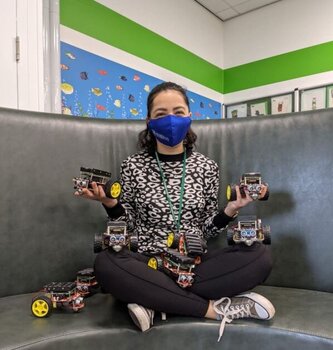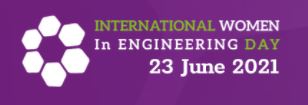
Meet Elektra, from the Department of Computer Science.
Hi, I’m Elektra and I am a PhD student in the Department of Computer Science.
I think I first became interested in Science while I was at school. I was doing very poorly at every subject that involved recalling information by memory. My ability to memorise random things was – and still is – very limited. This is why I was not my best with subjects like history, or geography. I could not retain any information that was not associated with something else. This is why, on the other hand, I loved maths and everything that involved problem-solving, such as physics and other STEM subjects.
My dad is a mathematician, and he was a great inspiration and support from a very early age. I feel like it was not as much the numerical literacy that he offered to me, as it was the ‘can do it’ attitude that came along it. I always treated maths as something interesting, cool and fun. Many people have the stereotypical belief that ‘maths is hard’. This belief leads to people having mathematical anxiety (or ‘math phobia’). They believe that they cannot be good at maths, but this is not based on their actual performance or abilities.
My University life began when I studied Mathematics in Aristotle University of Thessaloniki, with a special interest in Applied Mathematics. I then continued with a Master’s degree on Didactics and Methodology of Mathematics. This was a two-year joint degree programme offered by the departments of Mathematics and Education.
As part of my Master’s degree, we were studying theories of educational psychology and cognitive science, including theories of learning and aspects of human cognition, such as intelligence and creativity. I found all these subjects fascinating. As soon as I graduated, I decided to apply for a Master’s degree in the psychology department. Although I had no background in psychology, I got accepted and was also offered a scholarship to cover my fees and support my living expenses, which was amazing.
During these two years studying Cognitive and Educational Psychology I had the chance to learn how the human brain functions and study the nature, tasks, and the functions of cognition. We dived into theories about human perception, cognition, attention, memory and intelligence. We also learned how to design and run experiments with human participants, analyse the results and draw conclusions, used experimental psychology methods, psychometrics, and statistical data analysis for psychology, which required lots of advanced statistics.
After finishing my Master’s in Cognitive Psychology I started looking for ways to combine my mathematical background with my interest in cognitive psychology and my passion for Computer Science. And I found it! I joined the Computational Cognition Lab of the Open University of Cyprus, where I did postgraduate research, supervised by Dr Loizos Michael, about the human cognitive processes from the perspective of Artificial Intelligence. A whole new world opened for me, in a way I was not expecting when I was applying. I started exploring questions about the human cognition, from a perspective that was completely new to me. How can we get inspired by the human brain, to make intelligent machines? How can we make computers capable to solve problems that are trivial for humans, but hard for computers? How can we represent concepts in a way that ‘makes sense’ for computers? How can we teach machines some background knowledge so that they can understand stories? And how can we extract all this knowledge from humans, in order to collect a set of well-defined rules to represent all the common-sense knowledge that we humans have and use without even being aware? And then, even if we assume that we have all this knowledge nicely put into an ‘Encyclopedia of human common-sense, for machines’, how can we make machines use these rules in a meaningful way, to be able to use argumentation and draw their own conclusions, make predictions and have expectations? And even then, do we want the machines to always think rational, or do we want them to simulate human behaviour – which is not always rational? Can we simulate human biases and irrational thinking? How can we avoid machines falling into biases, if the data we are feeding them are created by humans, who are full of cognitive biases and implicit stereotypes? The list goes on and on…
During my years at the Computational Cognition Lab, my colleagues and I formed a team to participate in a robotics competition. We had no previous experience with robotics, but we soon found ourselves exploring robots designs. We bought sensors of all kinds, soldered, got burnt while soldering to build and programme our robots. We got the first prize at a national level, which gave us the ticket to travel to Estonia for the annual robotics festival ‘Robotex International’. That was a great experience and also so much fun!
In 2018 I came across a PhD position at the University of Liverpool. It was looking for people with prior experience in the intersection between Mathematics, Computing and Psychology. It was part of an on-going collaboration between the Department of Computer Science and the Department of Psychological Science, focusing on the interplay between mathematically defined concepts and human perception, the study of the combinatorial properties of random structures, and their relationship with the mechanisms that affect the way we see the world. It sounded exciting! I applied, got accepted, and here I am!
My research project at the University of Liverpool is a collaboration between the Computer Science Department and the Visual Perception Lab, in the Department of Psychology. I am supervised by Dr Michele Zito (a graph theorist and computer scientist) and Dr Marco Bertamini (a cognitive psychologist, expert in visual perception). As you can tell, my research lies in the intersection between graph theory and human perception.
In my research I am using models of graph theory to study aspects of visual perception, such as the perceived numerosity and the perception of graph drawings. I run experiments with human participants in the lab to study how different ways of drawing the graphs affect our ability to derive information about those graphs. I am also running experiments and simulations in the computer, to explore how we can use measures of graphs or properties of their drawings. This is to gain more insight into the graphs and the properties we cannot compute computationally.
Outside of studying I am the PhD student representative, a member of the Postgraduate Staff-Student Liaison Committee (SSLC) in the Department of Computer Science and also a member of the School of Electrical Engineering, Electronics and Computer Science's Athena SWAN / Equality, Diversity and Inclusion (EDI) Committee.
Since 2018 I have been an active member of the Computer Science Outreach team, where we design and organise activities for schools and the wider public in Liverpool. We deliver robotics workshops to schools from Merseyside who visit our labs, and we also host the Headstart Summer School with students from all over the UK. These students visit our department for a week, and take part in workshops related to different areas of computer science, such as robotics, cryptography and machine learning. Since the pandemic started, our team has designed a brand new fun school outreach activity, specifically suitable for remote delivery. It gives a playful introduction to binary classification and a more in-depth interactive exploration of artificial neural networks. Our outreach activity goes beyond schools. Recently we were at the World Museum delivering the ‘Python programming workshops’ as part of the ‘AI: more than human’ exhibition.
In my free time I love playing the guitar and percussion, listening to music, enjoying nature, and reading about psychology and the human brain. I love staying active and I am looking forward to going back to the squash court for a game, after having a long break due to the Covid restrictions.
For me it is very important that women get involved in Engineering/STEM. However, it is equally important for men to get involved too. The most important thing is that we make sure that nobody is held back from pursuing a career in those subjects, just because of their own limiting beliefs, stereotypes or cultural factors. We should be extremely careful and aware about the stereotypes we might be using and the cognitive biases we might hold, when it comes to talking or thinking about women in Engineering and STEM subjects.
There are plenty of female role models in my field. However, Maria Chudnovsky is a woman who inspires me in my current research on graph theory. She was one of the authors of the proof of ‘the strong perfect graph theorem’, which won a $10,000 prize offered by Gérard Cornuéjols of Carnegie Mellon University and the 2009 Fulkerson Prize. I had the chance to attend one of her talks live at a conference, and it is amazing how she can explain complex abstract concepts in a very direct and constructive way.
The advice I would give girls thinking of studying an Engineering subject would be…Do it! At least give it a try and see if you really enjoy it! Do not get stuck in stereotypes and don’t ever let anybody’s belief hold you back from doing all the things you love and make you happy. Approach everything with an open mind and give it a chance to experiment with it.
If you decide to take this journey, there might be times when people might assume things about your skills or abilities, just because of your gender, with no other information about your skills. I really hope that this will not ever happen, but if it does, I know it is hard and frustrating. Just keep in mind what your abilities are, and what you have achieved until now. External verification is always great, but it is also essential to have a well-grounded self-worth and confidence to keep us going. If you ever meet people who hold stereotypical beliefs about women in engineering / STEM, then you can always be a wonderful example to prove them wrong! This is how the stereotypes will eventually change. If women and men in STEM subjects are equally represented we might have a chance to shake stereotypical beliefs. Fingers crossed…You are our hope! 😊
In the future I would like to keep working in the intersection between cognitive psychology, computer science/AI, and Maths. One aim would be to partake in interesting creative and innovative research projects. Information visualisation and graph drawing is one possible direction, however projects involving research in mental health, cognitive science and AI are also very intriguing.
For the moment I am exploring research groups and available options, both in academia and in industry. I am open to anything that attracts my interest and my curiosity, and could be a good match for my skills and background so far, but I am always open for opportunities to learn new skills and explore new areas.

Find out more about International Women in Engineering Day 2021 #INWED21